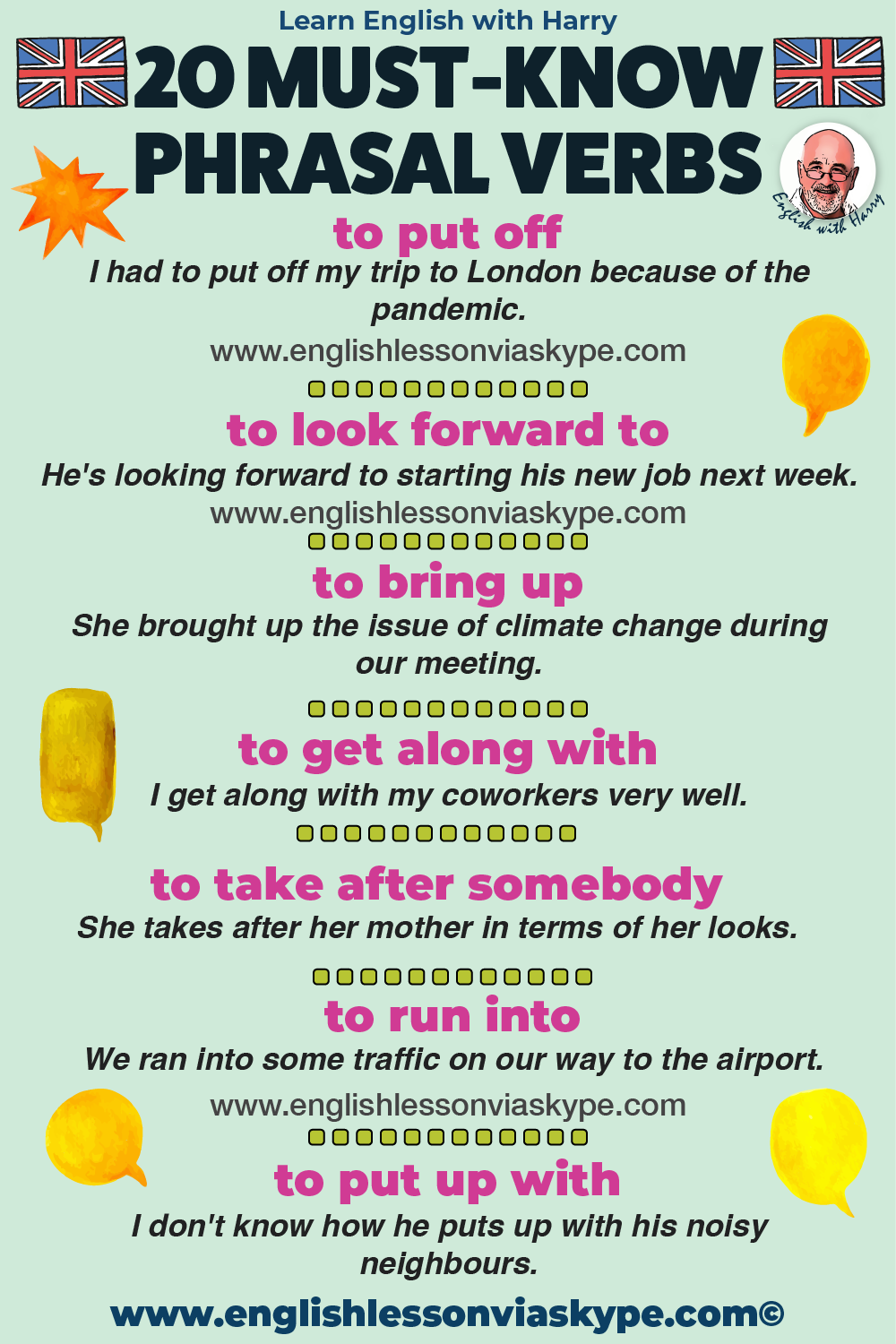Learn crucial phrasal verbs for daily conversations. Build your vocabulary and speak like a native with these 20 must-know speaking phrasal verbs for total English fluency.
This English lesson is beneficial not only for students aiming to learn new vocabulary in context but also for advanced English learners as a review. Learn phrasal verbs that are commonly used by native English speakers in daily conversations.
Listen to the podcast Speak Better English with Harry or watch it on YouTube at Learn English with Harry. englishclass101
list of popular phrasal verbs
Important phrasal verbs for daily conversations
Harry
In this English lesson, we’re going to explore 20 important phrasal verbs that you can incorporate into your daily conversations.
I’ll provide examples for each of them, and at the end, I encourage you to choose a few and practise using them.
You know the drill by now – practice is key to becoming comfortable with these phrases. Learning them by heart won’t be effective unless you also understand how, where, and when to use them.
improve english on a budget
Online English Courses from €7.99
to put off
Meaning: to postpone or delay something
Examples:
I had to put off my trip to London because of the pandemic.
Don’t put off doing your homework until the last minute.
to look forward to
Meaning: to anticipate something with pleasure or excitement
Examples:
I’m really looking forward to our trip to Hawaii next month.
He’s looking forward to starting his new job next week.
to bring up
Meaning: to introduce a topic in conversation
Examples:
She brought up the issue of climate change during our meeting.
He brought up his concerns about the company’s finances in the board meeting.
to get along with
Meaning: to have a good relationship with someone
Examples:
I get along with my coworkers very well.
I’m not sure if my dog will get along with my new kitten.
to take after sb
Meaning: to resemble someone in appearance or personality
Examples:
She takes after her mother in terms of her looks.
He takes after his father in his love for sports.
Popular phrasal verbs for daily conversations

to make up
Meaning: to reconcile or create a story
Examples:
We made up after our argument and apologised to each other.
She made up a story about why she was late for work.
to set up
Meaning: to establish or arrange something
Examples:
We set up a meeting with the client to discuss the project.
He set up his own business after working for a few years in the corporate world.
to run into
Meaning: to meet someone unexpectedly
Examples:
I ran into my old friend from college at the grocery store.
We ran into some traffic on our way to the airport.
They ran into some problems with their project.
to bring about
Meaning: to cause something to happen
Examples:
The new policies brought about positive changes in the company.
The invention of the smartphone brought about a revolution in communication.
to look into
Meaning: to investigate or examine something
Examples:
We need to look into the issue of customer complaints.
The police are looking into the matter of the missing person.
book your trial English Lesson
to come across
Meaning: to meet or find by chance
Example:
I came across an old friend in the supermarket.
He came across some interesting information while doing research.
to take up
Meaning: to start a new hobby or activity
Examples:
I’ve decided to take up tennis.
She took up photography as a hobby.
to put up with
Meaning: to tolerate or endure something unpleasant
Examples:
I don’t know how he puts up with his noisy neighbours.
I can’t put up with this heat anymore.
to settle down
Meaning: to establish a stable life
Example:
He wants to settle down and start a family.
After years of travelling, she finally settled down in a small town on the coast.
useful phrasal verbs for daily conversations

to turn down
Meaning: to reject or refuse an offer or request
Example:
I had to turn down the job offer because of the low salary.
She turned down his invitation to go out on a date.
to break down
Meaning: to stop functioning; to divide into smaller parts for analysis
Examples:
My car broke down on the way to work.
Let’s break down the problem into smaller, more manageable parts.
to give up
Meaning: to stop trying; to surrender or concede defeat
Examples:
I refuse to give up on my dreams.
After two hours of searching, the police gave up looking for the criminals.
to carry on
Meaning: to continue doing something
Examples:
Despite the rain, we decided to carry on with our picnic.
The teacher told the students to carry on with their work while she stepped out for a minute.
to cut off
Meaning: to disconnect or stop communication
Examples:
The phone cut off in the middle of our conversation.
During the storm, the power cut off and we had no electricity for hours.
Here you have 20 useful phrasal verbs for daily conversations in English that you can use in different situations. I’ve provided examples for each of them. Your task is to practice using them, but don’t limit yourself to the examples I’ve given. Come up with your own ideas and see if they work.
If you have any issues, feel free to reach out to me at englishlessonviaskype.com and I’ll gladly offer more suggestions, ideas, and practical examples.
This is Harry saying goodbye. Thanks for watching and listening. Join me again soon.
speak better English with Harry podcast- episode 445

more information
For more information on English grammar rules, English collocations and English idioms, check out the links below:
You can always study English advanced level at Learning English with the BBC and British Council Learn English.
You will love these English lessons

18 Colour Idioms in English
Here you will learn 18 colour idioms in English. Tickled pink meaning, red herring meaning, see red meaning and more.


Behaviour Phrasal Verbs in English
Learn behaviour phrasal verbs in English. Useful vocabulary to describe someone’s behaviour in English. Listen to the podcast Speak Better


English Phrases connected with an English Christmas
Here you will find a short text with English phrases connected with an English Christmas. Test your English reading comprehension.


